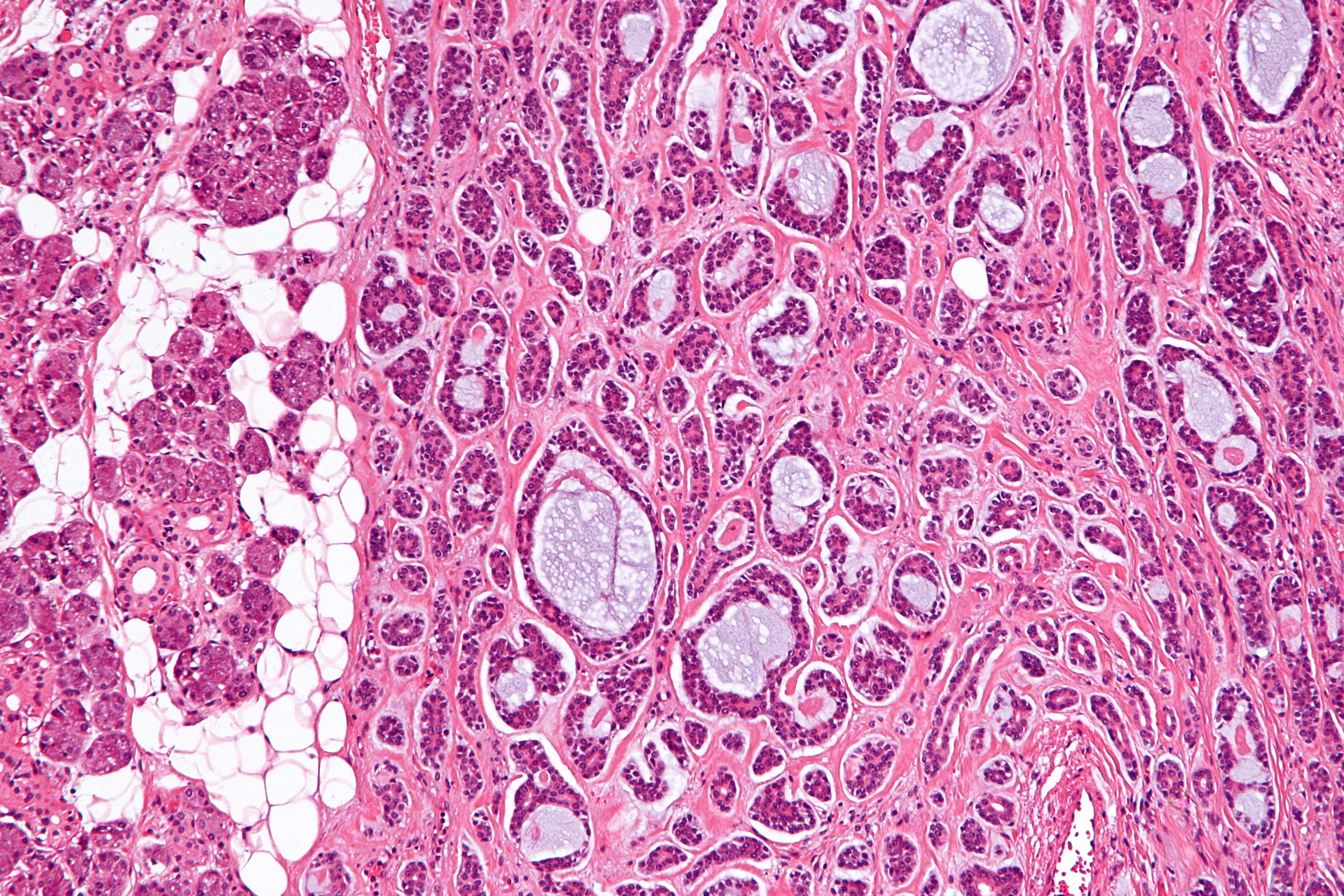Adenoid cystic carcinoma
| Adenoid cystic carcinoma | |
|---|---|

| |
| Synonyms | ACC |
| Pronounce | N/A |
| Specialty | N/A |
| Symptoms | Pain, swelling, numbness, facial nerve paralysis |
| Complications | Metastasis, recurrence |
| Onset | Middle age |
| Duration | Long-term |
| Types | Cribriform, tubular, solid |
| Causes | Unknown |
| Risks | Radiation exposure, genetic predisposition |
| Diagnosis | Biopsy, imaging studies |
| Differential diagnosis | Pleomorphic adenoma, mucoepidermoid carcinoma |
| Prevention | None |
| Treatment | Surgery, radiation therapy, chemotherapy |
| Medication | Cisplatin, doxorubicin |
| Prognosis | Variable, often poor in advanced stages |
| Frequency | Rare |
| Deaths | Varies |
== Adenoid Cystic Carcinoma ==
Adenoid cystic carcinoma (ACC) is a rare type of cancer that most commonly arises in the salivary glands. It is known for its slow growth, tendency to invade surrounding nerves, and potential for distant metastasis.
Pathophysiology[edit | edit source]
Adenoid cystic carcinoma is characterized by its unique histological appearance, which includes cribriform, tubular, and solid patterns. The tumor is composed of small, basaloid cells that form pseudocystic spaces filled with hyaline material. ACC is notorious for its perineural invasion, which can lead to significant neurological symptoms.
Clinical Presentation[edit | edit source]
Patients with adenoid cystic carcinoma often present with a painless mass in the affected gland, most commonly the parotid gland or submandibular gland. Due to its propensity for perineural invasion, patients may also experience facial nerve paralysis or other cranial nerve deficits.
Diagnosis[edit | edit source]
Diagnosis of ACC is typically made through a combination of imaging studies and biopsy. MRI is particularly useful for assessing perineural spread, as seen in the images below:
Histopathology[edit | edit source]
Histological examination reveals the characteristic cribriform pattern of ACC. Immunohistochemical staining, such as S-100, can aid in diagnosis:
Treatment[edit | edit source]
The primary treatment for adenoid cystic carcinoma is surgical resection with clear margins. Due to the high risk of perineural invasion, adjuvant radiation therapy is often recommended. Chemotherapy is generally reserved for metastatic disease.
Prognosis[edit | edit source]
The prognosis for patients with adenoid cystic carcinoma varies depending on the stage and location of the tumor. While the tumor is slow-growing, it has a high rate of local recurrence and distant metastasis, particularly to the lungs.
Epidemiology[edit | edit source]
Adenoid cystic carcinoma accounts for approximately 1% of all head and neck malignancies. It is more common in women and typically presents in middle-aged adults.
Related Pages[edit | edit source]
Search WikiMD
Ad.Tired of being Overweight? Try W8MD's physician weight loss program.
Semaglutide (Ozempic / Wegovy and Tirzepatide (Mounjaro / Zepbound) available.
Advertise on WikiMD
|
WikiMD's Wellness Encyclopedia |
| Let Food Be Thy Medicine Medicine Thy Food - Hippocrates |
Translate this page: - East Asian
中文,
日本,
한국어,
South Asian
हिन्दी,
தமிழ்,
తెలుగు,
Urdu,
ಕನ್ನಡ,
Southeast Asian
Indonesian,
Vietnamese,
Thai,
မြန်မာဘာသာ,
বাংলা
European
español,
Deutsch,
français,
Greek,
português do Brasil,
polski,
română,
русский,
Nederlands,
norsk,
svenska,
suomi,
Italian
Middle Eastern & African
عربى,
Turkish,
Persian,
Hebrew,
Afrikaans,
isiZulu,
Kiswahili,
Other
Bulgarian,
Hungarian,
Czech,
Swedish,
മലയാളം,
मराठी,
ਪੰਜਾਬੀ,
ગુજરાતી,
Portuguese,
Ukrainian
Medical Disclaimer: WikiMD is not a substitute for professional medical advice. The information on WikiMD is provided as an information resource only, may be incorrect, outdated or misleading, and is not to be used or relied on for any diagnostic or treatment purposes. Please consult your health care provider before making any healthcare decisions or for guidance about a specific medical condition. WikiMD expressly disclaims responsibility, and shall have no liability, for any damages, loss, injury, or liability whatsoever suffered as a result of your reliance on the information contained in this site. By visiting this site you agree to the foregoing terms and conditions, which may from time to time be changed or supplemented by WikiMD. If you do not agree to the foregoing terms and conditions, you should not enter or use this site. See full disclaimer.
Credits:Most images are courtesy of Wikimedia commons, and templates, categories Wikipedia, licensed under CC BY SA or similar.
Contributors: Prab R. Tumpati, MD










